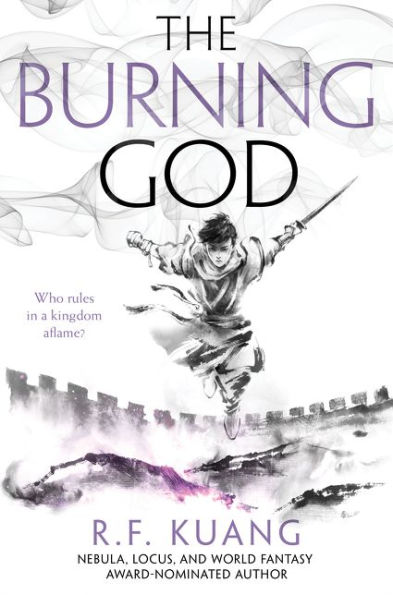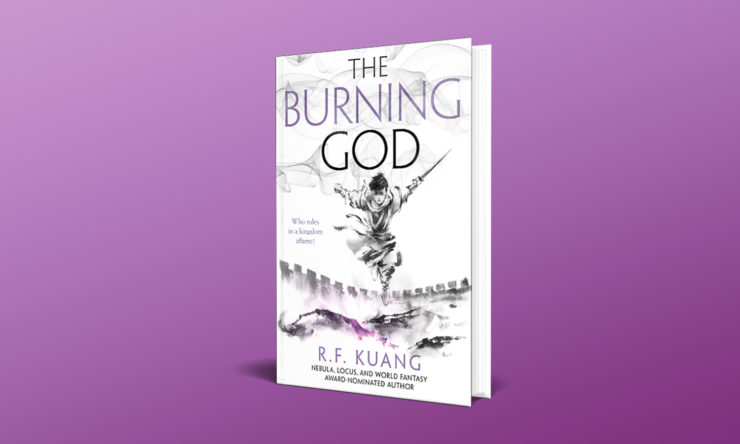Despite her losses, Rin hasn’t given up…
We’re excited to share an excerpt from The Burning God, the exciting end to R.F. Kuang’s epic Poppy War trilogy—available November 17th from Harper Voyager.
After saving her nation of Nikan from foreign invaders and battling the evil Empress Su Daji in a brutal civil war, Fang Runin was betrayed by allies and left for dead.
Despite her losses, Rin hasn’t given up on those for whom she has sacrificed so much—the people of the southern provinces and especially Tikany, the village that is her home. Returning to her roots, Rin meets difficult challenges—and unexpected opportunities. While her new allies in the Southern Coalition leadership are sly and untrustworthy, Rin quickly realizes that the real power in Nikan lies with the millions of common people who thirst for vengeance and revere her as a goddess of salvation.
Backed by the masses and her Southern Army, Rin will use every weapon to defeat the Dragon Republic, the colonizing Hesperians, and all who threaten the shamanic arts and their practitioners. As her power and influence grows, though, will she be strong enough to resist the Phoenix’s intoxicating voice urging her to burn the world and everything in it?
“Nezha.” Yin Vaisra beckoned with one finger. “Come here.”
Delighted, Nezha ran to his side. He’d been in the middle of a grueling Classics lesson, but his tutor had bowed and left the room as soon as his father appeared in the doorway.
“How go your studies?” Vaisra asked. “Are you working hard?”
Nezha swallowed his instinct to babble, instead mulling care.fully over his response. Vaisra had never asked him questions like this before; he’d never displayed much interest in any of his children except Jinzha. Nezha didn’t want his father to think him a braggart or a fool.
“Tutor Chau says I’m progressing well,” he said cautiously. “I’ve mastered the fundamentals of Old Nikara grammar, and I can now recite one hundred and twenty-two poems from the Jin dynasty. Next week we’ll—”
“Good.” Vaisra sounded neither particularly interested nor pleased. He turned. “Walk with me.”
Buy the Book


The Burning God
Somewhat crestfallen, Nezha followed his father out of the eastern wing into the main reception hall. He wasn’t quite sure where they were going. The palace of Arlong was a grand, chilly place consisting mostly of empty air and long, high-ceilinged hall.ways draped with tapestries depicting the history of the Dragon Province dating back to the fall of the Red Emperor’s dynasty.
Vaisra paused before a detailed portrait of Yin Vara, the for.mer Dragon Warlord before the Second Poppy War. Nezha had always hated this tapestry. He’d never known his grandfather, but Vara’s stern, gaunt visage made him feel small and insignificant every time he passed beneath.
“Have you ever wanted to rule, Nezha?” Vaisra asked.
Nezha frowned, confused. “Why would I?”
Ruling had never been in his stars. Jinzha, the firstborn son, stood to inherit the title of Dragon Warlord and all the responsibilities that came with it. Nezha was only the second son. He was destined to become a soldier, his brother’s most loyal general.
“You’ve never considered it?” Nezha felt vaguely as if he were failing a test, but he didn’t know what else to say. “It’s not my place.”
“No, I suppose not.” Vaisra was silent for a moment. Then he asked, “Would you like to hear a story?”
A story? Nezha hesitated, unsure of how to respond. Vaisra never told him stories. But although Nezha had no idea how to converse with his father, he couldn’t bear to let this opportunity pass.
“Yes,” he said carefully. “I would.”
Vaisra glanced down at him. “Do you know why we don’t let you go to those grottoes?”
Nezha perked up. “Because of the monsters?”
Would this be a monster story? He hoped it would be. He felt
a flicker of excitement. His childhood nurses knew that his favorite tales were about the myriad beasts rumored to lurk in the grottoes—the dragons, the cannibal crabs, the sh-women who made you love them and then drowned you once you got too close.
“Monsters?” Vaisra chuckled. Nezha had never heard his father chuckle before. “Do you like the grotto stories?”
Nezha nodded. “Very much.”
Vaisra put a hand on his shoulder.
Nezha suppressed a flinch. He wasn’t afraid of his father’s touch—Vaisra had never been violent toward him. But Vaisra had never caressed him like this, either. Hugs, kisses, reassuring touches—those belonged to Nezha’s mother, Lady Saikhara, who nearly suffocated her children with affection.
Nezha had always thought of his father as a statue—remote, foreboding, and untouchable. Vaisra seemed to him less like a man than a god, the perfect ideal of everything he’d been raised to become. Every word Yin Vaisra articulated was direct and concise, every action efficient and deliberate. Never did he show his children affection beyond the odd somber nod of approval. Never did he tell fairy tales.
So what was going on?
For the first time Nezha noticed that his father’s eyes looked somewhat glassy, that his speech seemed much slower than usual. And his breath… a pungent, sour smell wafted into Nezha’s face every time Vaisra spoke. Nezha had smelled that odor twice before—once in the servants’ quarters, when he’d been wandering around past bedtime where he shouldn’t have been, and once in Jinzha’s room.
He squirmed under Vaisra’s hand, suddenly uncomfortable. He didn’t want a story anymore. He wanted to get back to his lesson.
“I’ll tell you a grotto story,” Vaisra said. “You know Arlong rose as a southern power in the decades of warfare after the Red Emperor’s death. But in the last years of the Red Emperor’s reign, after he abandoned Dragon Province to build a new capital at Sinegard, Arlong was regarded as a cursed place. These islands lay inside a valley of death, of crashing waves and flooding river.banks. No ships that sailed past the Red Cliffs survived. Every.thing smashed to death against those rocks.”
Nezha kept utterly still as he listened. He had never heard this story before. He wasn’t sure that he liked it.
“Finally,” Vaisra continued, “a man named Yu, learned in shamanic arts, called down the Dragon Lord of the Western River and begged his help to control the rivers. Overnight, Arlong trans.formed. The waters turned calm. The flooding ceased. Arlong’s people built canals and rice paddies between the islands. In a few short years, Dragon Province became the jewel of the Nikara Empire, a land of beauty and plenty.” Vaisra paused. “Only Yu continued to suffer.”
Vaisra seemed caught in a reverie, speaking not to Nezha but at the tapestries, as if he were reciting dynastic lineage into the silent hall.
“Um.” Nezha swallowed. “Why—”
“Nature can’t be altered,” Vaisra said. “Only held at bay. Al.ways, the waters of Arlong threatened to break their leash and drown the new city in their fury. Yu was forced to spend his life in a state of shamanic hallucination, always calling upon the Dragon, always hearing its whispers in his ears. After several dozen years of this, Yu wanted desperately to end his life. And when the god’s takeover was complete, when he could no longer die, he wanted to ensconce himself in the Chuluu Korikh. But he knew that if he sought peace, someone had to take up his mantle. Yu could not be that cruel, nor that selfish. So what happened?”
Nezha didn’t know. But he could put this together like the pieces of a logic puzzle, like the kind that his tutors were always training him to solve for the Keju exam.
Father said this was a grotto story. And grotto stories were about monsters.
“Yu transformed,” Nezha said. “He became the monster.”
“Not a monster, Nezha.” Vaisra stroked a lock of hair behind Nezha’s ear. “A savior. He made the ultimate sacrifice for Arlong. But Arlong forgot him almost immediately. They saw his horrifying new form, his winding coils and sharp scales, and they received him with not gratitude but fear. Even his own wife did not recognize him. She took one look at him and screamed. Her brothers threw rocks at him and drove him out of the village, back into the grotto where he had spent decades praying to protect them. He…”
Vaisra’s voice trailed away.
Nezha glanced up. “Father?”
Vaisra was gazing silently at the tapestries. Confused, Nezha followed his eyes. None of these tapestries contained the story he’d just heard. They were all dynastic portraits, an endless row of finely embroidered likenesses of Nezha’s long-dead predecessors.
What was Father trying to tell him?
What sacrifices had the House of Yin made for Arlong?
“Your tutors told me you wanted to visit the grottoes,” Vaisra said suddenly.
Nezha stiffened. Was that what this was about? Was he in trouble? Yes, he’d asked, many more times than he should have. He’d begged and whined, pledging to keep to the shallows or even the opposite riverbank if only they’d let him get near enough to catch a glimpse inside the cave mouths.
“I apologize, Father,” he said. “I won’t ask again—I was just curious—”
“About what?”
“I thought—I mean, I’d heard about treasures, and I thought…” Nezha trailed off. His cheeks flamed. His words sounded stupid and childish as he uttered them. Silently he swore never to disobey his father’s word again.
But Vaisra didn’t chide him. He just gazed at Nezha for a very long time, his expression inscrutable. At last, he patted Nezha again on the shoulder.
“Don’t go to those grottoes, Nezha.” He sounded very tired then. “Don’t take on the burden of an entire nation. It’s too heavy. And you aren’t strong enough.”
Excerpted from The Burning God, copyright © 2020 by R.F. Kuang.










